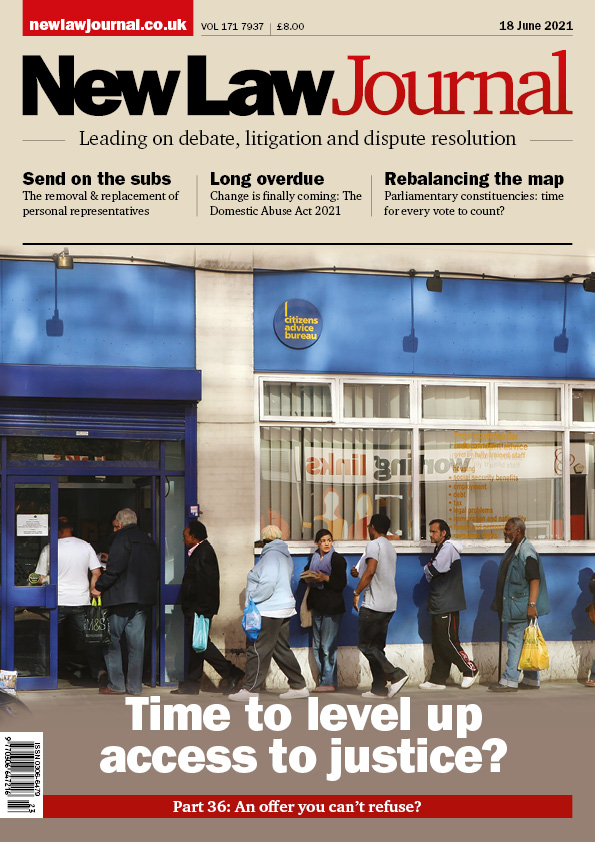THIS ISSUE

Lawtech may be booming, but the impact of technology on access to justice is a lot less clear, solicitor and author Roger Smith writes in this week’s NLJ.
The Domestic Abuse Act 2021 broadens the definition of abuse, recognises children in abusive households as victims in their own right, recognises ‘revenge porn’ as a criminal offence, stops the cross-examination of victims by perpetrators in court, creates new protection orders and establishes a Domestic Abuse Commissioner to stand up for victims.
In the first of a three-part series, Roger Smith explores the current & future state of the access to justice sector
Family lawyers need to ensure they have a clear & comprehensive understanding of the wide-ranging nature of domestic abuse, say Jenny Duggan & Francesca White
In the light of a recent case, John McMullen highlights the potential use of TUPE, reg 4(9) in unfair dismissal claims
Nathan Wells examines the removal & replacement of personal representatives
Alistair Spencer outlines the law underpinning & resolving burial disputes
Making every vote count the same: Alec Samuels reports on long-overdue updates to parliamentary constituencies
Kris Kilsby outlines why a Pt 36 offer is the best method of protection during costs assessment proceedings
MOVERS & SHAKERS

Keystone Law—Milena Szuniewicz-Wenzel & Ian Hopkinson
International arbitration team strengthened by double partner hire

Coodes Solicitors—Pam Johns, Rachel Pearce & Bradley Kaine
Firm celebrates trio holding senior regional law society and junior lawyers division roles

Michelman Robinson—Sukhi Kaler
Partner joins commercial and business litigation team in London
NEWS
The government has pledged to ‘move fast’ to protect children from harm caused by artificial intelligence (AI) chatbots, and could impose limits on social media as early as the summer
All eyes will be on the Court of Appeal (or its YouTube livestream) next week as it sits to consider the controversial Mazur judgment
An NHS Foundation Trust breached a consultant’s contract by delegating an investigation into his knowledge of nurse Lucy Letby’s case
Draft guidance for schools on how to support gender-questioning pupils provides ‘more clarity’, but headteachers may still need legal advice, an education lawyer has said
Litigation funder Innsworth Capital, which funded behemoth opt-out action Merricks v Mastercard, can bring a judicial review, the High Court ruled last week







